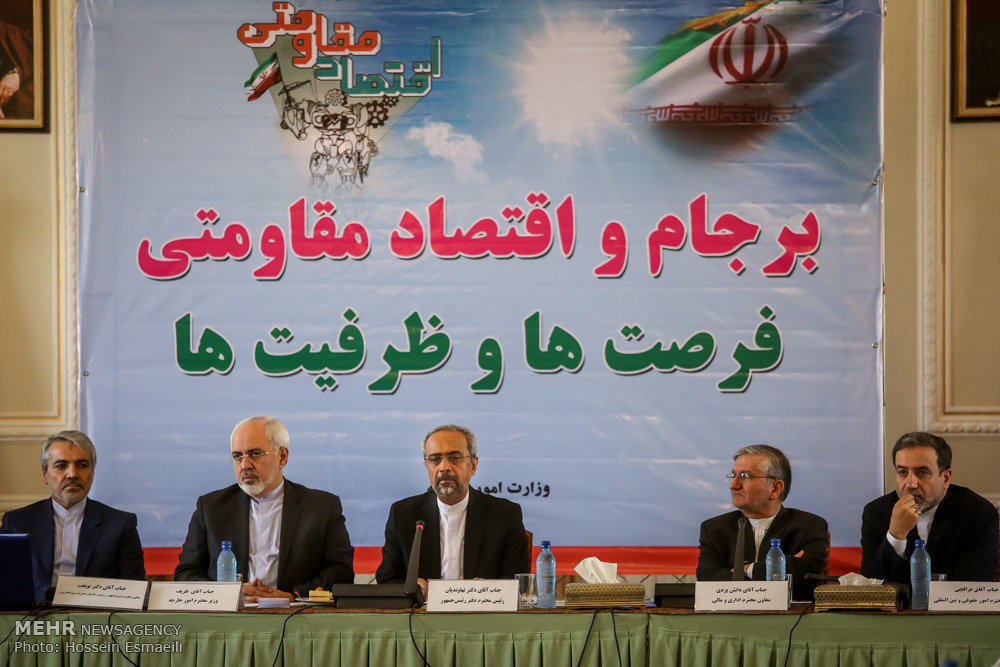People should see JCPOA results: Zarif

TEHRAN – Foreign Minister Mohammad Javad Zarif, the principal architect of the nuclear deal with great powers, said on Saturday that the Iranian people should in practice see the results of the deal, officially called the Joint Comprehensive Plan of Action.
According to the deal, brokered in July 2015 and went into effect in January, sanctions against Iran are lifted in exchange for some limitations on Tehran’s nuclear activities.
“In the new situation, all the ambassadors’ efforts should be focused on developing the country’s economy and the people’s livelihood and the people should feel the JCPOA results in practice,” Zarif told an annual gathering of the Iranian ambassadors in Tehran under the slogan of “JCPOA and Resistance Economy: Opportunities and Capacities”.
The foreign minister highlighted the necessity of presenting a “fair” and “realistic” report on results of the JCPOA.
Iran’s diplomatic missions in foreign countries can play “important” and “fundamental” role in preparing a “precise” and “real” report on the JCPOA results, especially in financial and banking transactions, the foreign minister noted.
Ali Akbar Salehi, chief of the Atomic Energy Organization of Iran who also played an important role in discussing the technical aspects of the nuclear deal with U.S. Energy Secretary Ernest Moniz, also told the diplomats that Iran has made considerable progresses in nuclear technology especially in medical and industrial fields.
Salehi, a nuclear physicist from MIT, added the quality of process of uranium enrichment in Iran is also progressing.
‘False propaganda can undermine JCPOA opportunities’
Abbas Araqchi, the deputy foreign minister for legal and international affairs who was the second most important negotiator in nuclear talks, told the diplomats that the JCPOA has “stabilized” the country’s nuclear technology.
He also said that the Iranophobia policy is a “false propaganda” that can undermine the opportunities created after the implementation of the JCPOA.
However, he said the economic relations of the country are getting normalized.
Mohammad Nahavandian, an economic expert who is the head of the presidential office, also called JCPOA a “coordinated, scholarly, prudent, and patient move” which removes hurdles for economic progress.
Nahavandian said the sanctions acted as a brake for flourishing of resistance economy both domestically and internationally.
“The JCPOA is not going to bring economic growth; rather it removed one of the main impediments in the way of economic growth so that by relying on domestic potential and using foreign capacities economic prosperity can be achieved.”
He added that the post-JCPOA condition, especially in economic areas, is more important than the JCPOA itself. However, he noted, a materialization of the people’s expectations with the implementation of the JCPOA is time-consuming.
He added the Rouhani administration from the very beginning did not wait for the lifting of sanctions and it believed that sanctions “were not and will not be” the cause of all problems and therefore it revised financial and monetary policies.
Ambassadors must give “assurances” to the private sector of the countries in which they serve about importance of economic cooperation with Iran, the head of the presidential office suggested.
He said foreign economic entrepreneurs who are interested in the Iranian market should be “connected to the private entrepreneurs” in Iran.
“For development of economic ties with the world all opportunities should be seized at the shortest time, however we should avoid haste in order to avoid a repetition of past mistakes so that our country would not be turned into a great consuming market.”
‘Over $3b in foreign direct investment have been attracted’
Management and Planning Organization director Mohammadreza Nobakht also said more than 3 billion dollars in direct foreign investment (FDI) have been attracted since the signing of the nuclear deal. Nobakht also said Iran’s oil exports have more than doubled since the deal went into effect.
Nobakht also called on ambassadors to facilitate the flow of foreign investment in water, environment, and rail transport projects in accordance with the plans of the resistance economy.
NA/PA

Leave a Comment